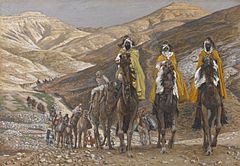Matthew 2:1 facts for kids
Quick facts for kids Matthew 2:1 |
|
|---|---|
|
← 1:25
2:2 →
|
|

James Tissot - The Magi Journeying (Les rois mages en voyage) - Brooklyn Museum
|
|
| Book | Gospel of Matthew |
| Christian Bible part | New Testament |
Matthew 2:1 is the first verse in the second chapter of the Gospel of Matthew. This book is part of the New Testament in the Bible. This verse starts a new and important part of the story about Jesus's birth. It describes the journey of the Magi, often called the "wise men," who traveled to see King Herod in Jerusalem after Jesus was born. This exciting part of the story continues through Matthew 2:12.
Contents
What the Verse Says
The original text of this verse was written in Koine Greek, an ancient form of Greek. Different Bible versions translate it into modern languages.
For example, the New International Version translates this passage as:
- After Jesus was born in Bethlehem in Judea, during the time
- of King Herod, Magi from the east came to Jerusalem.
You can compare many other versions of this verse at BibleHub Matthew 2:1.
Jesus's Birth Story
The Gospel of Matthew doesn't spend much time describing the actual birth of Jesus. It mentions it briefly in Matthew 1:25 and this verse. Unlike the Gospel of Luke, Matthew's story focuses more on the events that happened before and after Jesus's arrival.
Why Bethlehem is Important
This verse is the first time Bethlehem is mentioned in Matthew's Gospel. It's called "Bethlehem in Judea" to show it's the famous town in the heart of the Jewish land. There was another town called Bethlehem in a different region, so this helps avoid confusion.
Jesus being born in Bethlehem was very important for both Matthew and Luke. It connects Jesus to King David, a great king from the Old Testament. David was also born in Bethlehem. This connection helped show that Jesus was the rightful heir to David's royal line.
The verse also mentions "Herod the King." This refers to Herod the Great, who ruled from about 47 BC until around 4 BC.
Who Were the Magi?
The word magi originally referred to priests in ancient Persia who followed a religion called Zoroastrianism. However, by the time Matthew's Gospel was written, the word could mean anyone interested in special knowledge, like astrology (studying stars) or interpreting dreams. Since the chapter mentions their interest in stars, it's likely these Magi were astrologers.
The King James Version of the Bible translates magi as "wise men." Modern scholars think "astrologers" or "magicians" might be a more accurate translation. Matthew's Gospel doesn't say how many Magi there were, only that there was more than one. Later traditions added details like them being kings or having specific names.
Where Did the Magi Come From?
Matthew only says the Magi came "from the east." Scholars have different ideas about where this "east" might be.
- Some believe they came from Persia or Parthia, as that's where the first Magi were from.
- Others think they might have been from Babylon, which was a major center for astrology at that time.
- The oldest idea, from about 160 AD, suggests they came from Arabia. This fits well with the gifts they brought, which were common in that region.
Many experts believe the author of Matthew might not have had a specific place in mind. The phrase "from the east" could simply be used to add a sense of mystery and exoticism to the story.
See also
 | Jessica Watkins |
 | Robert Henry Lawrence Jr. |
 | Mae Jemison |
 | Sian Proctor |
 | Guion Bluford |

